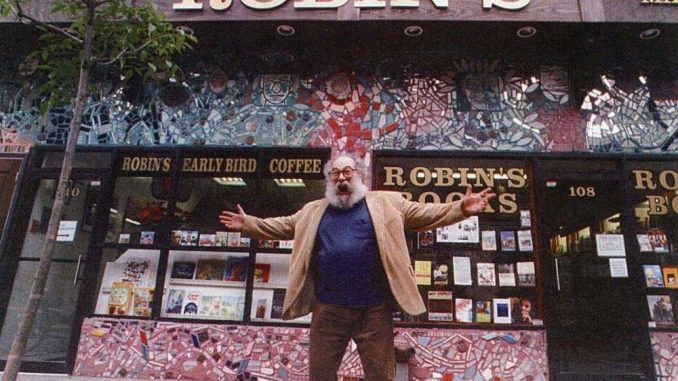
For Larry Robin, picking up a few night shifts evolved into a lifelong career.
As a Central High School student in 1960, Robin began working night shifts for his grandfather’s bookstore at 6 N. 13th St. His grandfather, David, founded Robin’s Bookstore in 1936 — a Depression-riddled year — with sons Herman and Morris.
After 76 years in business, Robin’s Bookstore shut its doors at the end of 2012.
“I’m going to miss the interaction and sharing information with customers,” Robin said.
Despite facing censorship battles and location changes, the store managed to survive longer than any other bookstore in Philly. Seventy-six years later, however, things have changed.
The former entrance of the bookshop sits between Zavino Wine Bar Pizzeria and Barbuzzo. The narrow doorway leads to the second floor that was once adorned with books, but is now void of merchandise
The “Robin’s” sign that hung above the first floor has disappeared.
Fifty years ago, Robin’s Bookstore was considered a refuge for the counterculture revolution. The bookstore moved to the corner of 13th and Sansom streets in 1960 and Robin began working in the paperback department. The same year, President John F. Kennedy was elected and the social and political content of America was drastically changing.
This spurred Robin’s Bookstore to add more contentious literature regarding anti-war, race relations, human sexuality, women’s rights and civil rights to its collection.
“We were more than just a commercial institution,” Robin said. “We sold books that many bookstores would not sell.”
Of those controversial books was Henry Miller’s “Tropic of Cancer,” known for its explicit and outspoken depictions of sexuality.
The store sold upwards of 7,000 copies and was the only bookstore in Philadelphia to sell the banned book. In 1964, Philadelphia District Attorney James Crumlish, Jr., sued Robin’s Bookstore after refusing to remove the book from its shelves. Though Robin’s lost, the Supreme Court later reversed another similar case, making it legal to sell “Tropic of Cancer” in the United States.
In 1981, the store moved to 110A S. 13th St., its third and final home. A second floor was added, and Robin began holding poetry readings and open discussions with political speakers, marking the store as a prominent place in the community.
Though it has endured for many years, business has always proven difficult, Robin said.
As of late September, the store’s website began promoting 60 percent discounts on its merchandise, assuring customers that the end has finally come.
“We were losing money, and you can’t continue on forever,” Robin said.
The bookstore struggled during the 1990s. According to the store’s website, half of the independent stores across the nation went bankrupt around that time.
Stores such as Barnes & Noble and Borders are partially to blame for the decline of independent stores. National chains that sell movies, music and books surpassed tiny local book shops, withering away at least a dozen in Philadelphia alone, according to the store’s website.
People are now embracing cheaper and more accessible methods for reading, such as e-books, rather than carrying an uncomfortably heavy load of books. In the age of Amazon.com and other online retailers, reading actual hardback and paperback copies are slowly dwindling to a cultic fascination.
Despite having closed the doors of his grandfather’s bookstore, Robin will continue to hold poetry readings, children’s programs and other book-related events through Moonstone Arts Center, a nonprofit organization he co-founded with his wife in 1983.
Future events will include weekly poetry readings at Fergie’s Pub on 12th and Sansom streets and a program at the end of the month about the turn of the century African American journalist, Ida B. Wells.
Dissipating bookstores, like that of his grandfather, will result in more lost than just the physical store, Robin said.
A level of communication is hindered by the advent of the Internet, Robin said.
“With the Internet, you can find exactly what you’re looking for,” Robin said. “But what’s most important is to find what you weren’t looking for.”
Naveed Ahsan can be reached at naveed.ahsan@temple.edu.



Be the first to comment